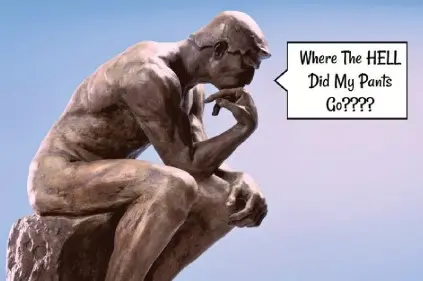I have always been a reflective person.

Philosophy was one of my favorite classes in college, and even though it was just a general education course, it opened my mind to seeing the world in different ways.
The philosophy professor I had was a retired priest, and this, in and of itself, was extremely interesting to me. I never thought someone who devoted their life to a specific religion would be able to teach a course on varying philosophies, some of which challenged his own profession.
As a young man, with plenty of ignorant beliefs and limited real-life knowledge, I think being a student in his class was eye-opening to me – like Neo taking the red pill in the Matrix.
Besides being a fascinating man, he was also a great story teller.
While we were prepping for our final exam, he shared a story about a final exam one of his colleagues had given to a philosophy class.
Now if you’re old like me, you remember that many of these final exams were completed in these small blue books with blank lined pages, where you would handwrite your answers in essay style form – this was one of those exams. Once the class was seated, the professor went to the board and wrote the prompt to the final exam. All he wrote, in big letters, was: “Why?” – he looked at the class and said you have 2 hours.

You could feel my entire class lean in after he said that, on the edge of our seats, waiting for the answer.
He said the class started writing frivolously… they were quoting Socrates, Plato, Aristotle, and the like… describing how they would have all answered this question differently, pulling on everything they had learned about these famous philosophers throughout the class.
One student however, took his blue book, opened it up, scribbled something into it, closed it, handed it to the professor and walked out of the exam.
The other students looked up in disbelief for a second, and then buried their heads back into their books, to jam as much knowledge as they could onto those lined pages before their time was up.
So my professor asked us, what did that one student scribble into his book as the answer to the final exam? No one spoke up.
He said, in answer to the prompt of “Why?” the student answered with, “Why not?”.
That student received an A on his final.
This story really hit home for me. I think it showed me the power of taking risks, believing in my own convictions, and how it’s ok to stand out amongst the crowd.
Admittedly, I would have been one of those students trying to throw down everything I knew about philosophy into that blue book, regurgitating everything I had memorized. I would have judged that student as a failure, assuming he didn’t study or have any clue how to pass.
In hindsight, he understood the assignment better than the rest of the class, demonstrating his understanding of philosophy rather than trying to prove he could remember facts.
We’ve grown up in an educational system that teaches to the standardized tests. We say that we want students to think critically, but we don’t incentivize them to.
“How will I get my precious grade if I don’t show this professor that I remember everything that he taught us???”
“How will our school get funding if I don’t get these students to fill in the right bubble on the scan sheet???”
It’s funny to think that something like this anecdote has stuck with me for all these years. Something as innocent and expected as a philosophy student answering a philosophy question with a philosophical answer… and yet, it was such a standout from the norm in education as I have come to know it, that I was awe-struck in the heroism of such a simple act. As soon as the professor told us that the student answered with, “Why not?” I knew the answer was 100% correct as if to say, “well of course that’s the answer”. But I also knew with every fiber of my being that I would have filled almost the entire blue book trying to get to the same result.
I believe we all have moments like these in our lives that have a major impact on how we think about the world and process information – our “Aha! moments”. When we recognize these moments, we should reflect on them and always be sure to carry them with us. For all the noise out there in the world today, any bits of wisdom that come your way are special, and should be treated as such.
I’m grateful to have had such an interesting and inspiring professor. While I only got a B in his class (stupid blue book exam), I think he would be proud to know that this story has stayed with me all of these years and has such a profound impact on how I view and interact with the world. Afterall – expanding your mind and thinking critically is the whole the point, isn’t in?
What are some of your, “Aha! moments”?


